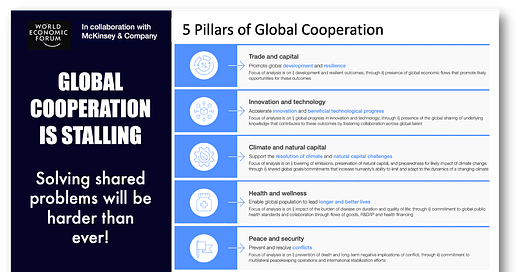Global Cooperation is Stalling: Be Afraid, Be Very Afraid
Declining cooperation will make the world poorer as we deal with poly-crises
Global cooperation is more important than ever, and why the decline in global cooperation metrics since 2020 is of great concern.
The world faces poly-crises, problems like war, climate change, and health that all hit at once and will only be solved through cooperation.
Declining cooperation should worry us all as it speaks to our shared future. Whether it's health, AI, or even fintech, global cooperation is requisite to embarking on our journey to a new tech-focused world.
Without cooperation, the benefits of innovations will be unevenly shared and likely increase inequality and, with it, social unrest.
👉TAKEAWAYS
The Five Pillars of Global Cooperation
– Trade and capital: Positive Growth
Trade and capital cooperation grew through the pandemic disruption, but slowed in 2023; geopolitical tensions and new restrictions make the future path unclear.
– Innovation and technology: Flat since 2020
Flows of data, IP and international students powered an increase in cooperation until 2020, but new questions have arisen about how to work together to harness opportunities.
– Climate and natural capital: Positive growth
The level of cooperation for climate and natural capital has been rising steadily, due in large measure to an increase in commitments, but emissions also continue to rise.
– Health and wellness: Negative growth
Cooperation in health and wellness rose swiftly in response to the pandemic, but appears to be settling back to historical patterns.
– Peace and security: Sharply negative!
Cooperation in peace and security has declined since 2016 and plummeted recently.
👊STRAIGHT TALK👊
For our community’s focus on fintech and AI the downturn in cooperation in Innovation and Technology should worry us all. It matters.
While virtually all categories measured in the tech index have declined in the 2020-2022 period (see the above graph), the decline is most pronounced in the reductions in international students, IT Goods, cross-border patents, and cross-border R&D.
These most impacted sectors can be traced to China-US tensions on student, chip, and AI technology transfers. These issues are predominantly based on national security issues, but the index shows us clearly how they are having global repercussions.
The WEF suggests that the US and China strike a compromise on foundational research, student exchanges, and regulation of new GenAI tech.
I said in the title to “be afraid,” and I meant it, as I don’t see compromises happening anytime soon.
The US is increasingly protectionist over its technology, chip bans being the best example, while China is retaliating by limiting rare earth mineral exports to the US.
Right now, the word compromise isn’t in anyone’s vocabulary.
The result is that the entire world will be poorer as tech cooperation declines and our most pressing problems go unsolved.
Thoughts?
Subscribing is free!
The button says pledge, but Substack adds that not me.
Don’t be afraid to click!









